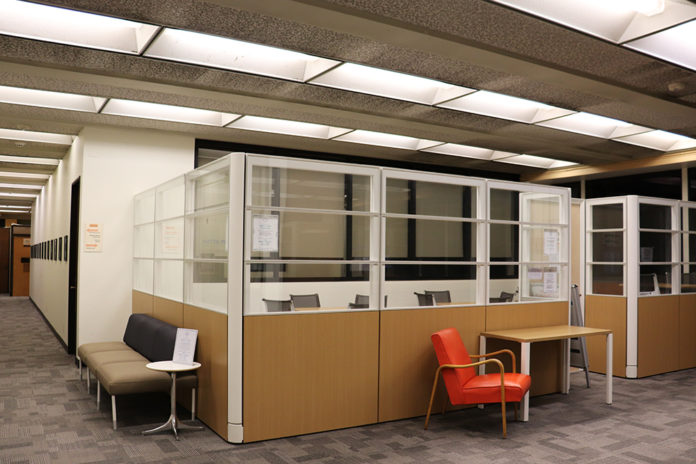
Thirteen Writing Center student advisers attended the 2019 Southern California Writing Centers Association Tutor Conference Feb. 23 at the University of California, Irvine. Professor Julie Prebel, director of the writing center & programs, said the writing advisers from Occidental led more panels than any other institution and crafted these various workshops on the theme of the conference, “invisibility.”
According to the association’s website, the conference has taken place annually for the past 14 years, and this year’s theme, “invisibility,” focused on the unseen and unexplored aspects of college writing centers.
Writing advisers at the conference led 37 panels in one day. In each panel, writing advisers from different institutions in and around Southern California presented their research and arranged different workshops for their fellow advisers to attend.
In Fall 2018, the 13 Occidental students formed three panels which explored topics such as developing confidence in new advisers, helping advanced writers and utilizing embedded tutoring strategies. All three panel topics were approved to be presented at the conference.
Bethany Widen (sophomore) was a member of the panel titled “Faking It ’til Ya Make It: Developing Confidence as a New Writing Advisor” and presented at the conference along with sophomores Wafa Abedin, Amelia Blankenau, Jackie Dall* and Ima Odong. Widen’s panel researched ways to develop confidence in new writing advisers. According to Widen, there is much more attention spent on students who utilize writing centers rather than the writing advisers themselves.
“Everyone on my panel is a new writing adviser — we’re all in our first year,” Widen said. “So, our panel is seeking to find a way to empower student writing advisers who may be feeling imposter syndrome or a lack of confidence in their ability.”
According to Widen, all panels included presentations, workshops and activities closely related to their topic. For example, Widen’s panel invited the participating advisers to talk to each other and share their experiences with difficulties. Widen said some of the privileges Occidental writing advisers possess are not something their counterparts in other institutions similarly enjoy.
“One of the things that struck me the most was the level of privilege that Oxy has,” Widen said. “When I was talking to some of the other writing advisers, they were mentioning they have students who have trouble obtaining food, or who are full-time parents with kids. That’s just not the student population we serve at Oxy, so I think it is really a realization that we are incredibly privileged to be able to go here.”
Emma Pottenger (sophomore) was a member of a panel titled “Teaching an Old Dog New Tricks: Helping Advanced Writers,” another student panel led by sophomore writing advisers Eliot Brody*, Zach Goodwin*, Kia Mackey and Madison Taggart. Pottenger agreed with Widen and added that the relative time flexibility Occidental advisers have makes their schedules more manageable.
“In our Writing Center, our focus is generally about how to make a better paper,” Pottenger said. “In other institutions, you had to schedule around because most students are commuters, or they had to have their writing shifts in the middle of the day, or right after they got out of class … whereas here, it’s late-night because everyone is within the vicinity of the school.”
During their panel, Pottenger and other writing advisers presented on how writing centers can help advanced writers improve their work. Pottenger said most students who come to the center tend to be first years who are working on their Cultural Studies Program (CSP) papers. Fewer upperclassmen visit the center to work on their comprehensives. The aim of the panel was to figure out how to encourage more advanced writers to come to the center and how to help them effectively once they are there. The panel included information on interactive word choice and depth-of-analysis activities to engage participants.

In addition to hosting their own panels, the Occidental advisers also attended other panels and a “community hour” during which schools put up stands to showcase their research. Pottenger and Widen both said they found the panel “Overcoming Mind-Body Disconnect in Writing Through Somatic Movement” presented by a writing adviser from Pitzer College to be particularly interesting. Widen said the Pitzer panel was about incorporating body language awareness into the writing center.
Prebel attended a separate writing center directors’ meeting with her counterparts from other institutions, discussing issues ranging from improving writing centers to advancing the writer center association. Prebel said she would be collecting feedback from the advisers and, ideally, they would visit the conference again next spring.
Members of the third Occidental student panel, “Differences in Visibility: Drop-In Hours vs. Embedded Tutoring,” presented by the Writing Center’s writing fellows, did not respond to interview requests.
*Zach Goodwin and Eliot Brody are section editors for The Occidental. Jackie Dall is the communications director and a layout editor for The Occidental.
![]()



































